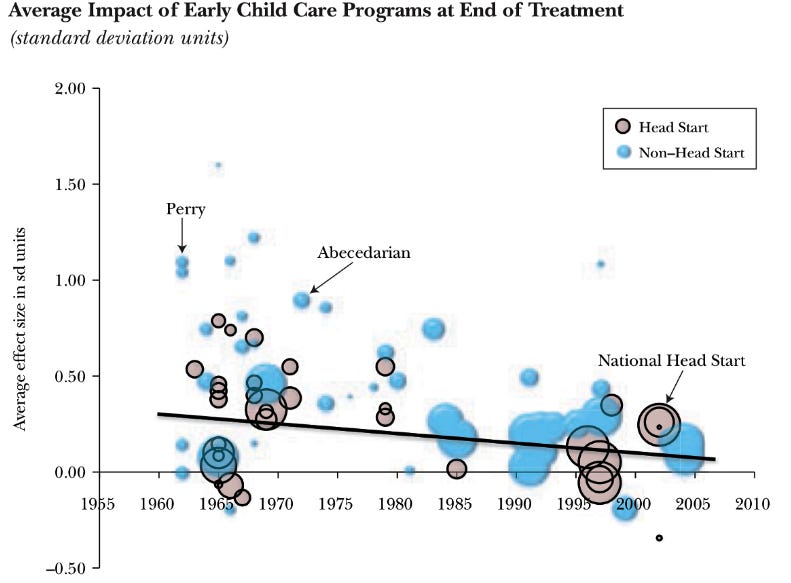Short Week: The Main Thing with Kids is to Keep Them Alive
keep the pre-k, gimme that childcare

This is the second post in (the first annual?) Short Week at freddiedeboer.substack.com. Since people constantly complain that my stuff is too long, this week all posts will be 500 words or less. We will return to our usual longwinded ways next week.
There’s been a big debate about childcare among the wonky set. This is good news, mostly; it reflects a very real chance at meaningful subsidy for an essential public good. But it also keeps touching on the unfortunate creep of teacher licensure into childcare and the growing tendency to see all childcare as equivalent to K-12 schooling. That’s bad for several reasons, though I get the political logic. Advocates want to justify the costs, and the term “pre-k” has a magical aura. People have convinced themselves that it’s a silver bullet. This is untrue, and as I’ve written before the returns from pre-k are probably somewhere between middling and negligible. But liberal wonks have clung to it like death because they need to believe that something works. And since they’ve made that claim relentlessly for a half-century, people hear “pre-k” and think that’s something we should fund. So childcare is out, and pre-k is in.
The trouble is that, when you call people teachers and say what they do is teaching, people want to license it. Licensure bids up the cost of that labor, at least theoretically, which is… well, I want people in childcare to earn a living wage, but imposing licensing requirements is a screwy way to do it, compared to a higher minimum wage and redistributive programs. And it devalues the true purpose of childcare, which is also an underrated aspect of public schools: keeping children alive when their parents can’t watch them.
American schools are incredibly safe. For some demographics, children are significantly safer at school than at home. Parents, likely driven by a sensationalistic media, think they’re more dangerous than they are. But in many ways the most important service provided by K-12 schools is warm, safe, stimulating environments for kids whose home lives are filled with deprivation and instability. This was an argument in my book - politicians and policymakers from both sides of the aisle dramatically overemphasize the educational purpose of school relative to the childcare aspect. (“Warehousing,” if you prefer the pejorative.) The existence of free safe warm places with subsidized meals for children to go to represents a vast human good that we have taken for granted for a long time. Since the educational benefits of early childhood education remain entirely unproven, I’d much rather we talk about childcare than pre-k. Keep the kiddos alive, and we can worry about schooling when they’re older. A staff that knows first aid working in buildings that won’t burn down that have food for hungry kids is what’s most important. Warm, safe, and fed comes first. Learning will be there when they’re old enough.




Thank you for highlighting the role of schools in keeping kids safe, fed, and warm. I grew up in Minnesota, and my mom taught special education in a low-income, majority-minority high school for most of her career. The school provided breakfast as well as lunch and after school snacks to any child who wanted them. It also provided something I had never thought about before: heat during Minnesota’s brutal, long winter.
My mom told me something once that broke my heart: you know how, as kids, we all couldn’t wait for weekends, holidays, and summer vacation? How we would get so excited and happy? Well, my mom’s students dreaded school breaks. They would linger after school on Friday afternoons and on the last day before break until they had to be kicked out. My mom said she could see them getting progressively sadder as the breaks approached. Think about how different their world is from that of most policymakers.
These kids were not heading to college; it was counted a success if they were able to pass the state reading test and graduate. The school did not give them the kind of intense academic education most policymakers say we should strive for. The school gave them something much more important: a place to let down their guards and be cared for.
My wife and I run a childcare- well, she runs it, and I help as much as I can between shifts.
All children old enough to walk about are wee robots designed to self-destruct as creatively as possible. Your job is to toss monkey wrenches into their gears and sand in their gas tanks all day so they can get home alive. Astounding, really, how ambitious the little dudes are.
It would be grand to design system where you don’t have to have a second parent work full time to afford childcare so they can afford to work full time, but in its absence “keep the toddlers from suiciding” really should be the guiding principle rather than setting them up for algebra classes or whatever.